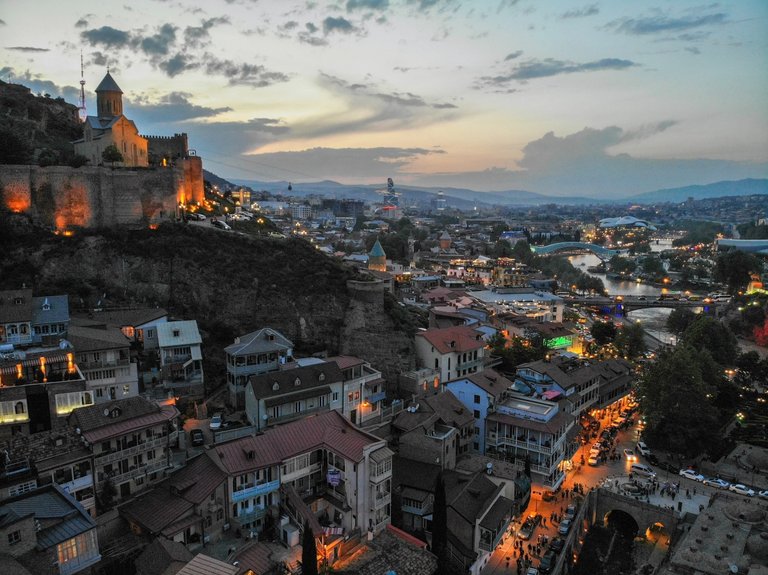COVID-19 is now arguably the gravest threat facing the planet. It will be equally difficult for nations on every continent to face the challenge. But it appears at least for now, Georgia, a small country of fewer than 4 million people at the crossroads of Europe and Asia, is ahead of the curve when dealing with the virus.
Russell Thompson (@steem-beat) Tbilisi, Georgia
April 9th, 2020

Tbilisi, Georgia. Photo credit: Unsplash
The World Health Organization declared a pandemic in connection with coronavirus on March 11, 2020. The outbreak of pneumonia-like symptoms originated in Wuhan, China in December 2019, caused by a previously unknown strain of coronavirus.
On January 21, China confirmed that the coronavirus was contagious from human to human. Lockdowns were put in place across Hubei Province to contain the outbreak.
The latest statistics make for grim reading, a death toll of 88,630. Coronavirus has now infected 1,487,870 people worldwide, while 331,705 have recovered.
The most harrowing accounts at this time are still coming from Italy, where 17,669 have been killed. Incredibly, in March Italy overtook China, a country of 1.3 billion people, according to official data, where supposedly only 3,355 have been killed by the virus.
The United States of America and Spain stand as the top two for the number of coronavirus infections with 434,791 and 152,446 respectively, but in Spain the mortality rate of around 10% has been much higher when measured against 15,238 deaths
Ekaterine Chakvetadze, a medical professional working at the Department of Internal Medicine at the Southern Network Hospital in Paris, believes Georgia's response compares favorably to that of more developed nations such as France.
“I thank the National Center for Disease Control of Georgia for combating the virus so effectively. I am amazed that France failed to do so, and in general, the World Health Organization did not take into account the risk posed by the new coronavirus. The previous coronavirus epidemic came to a halt soon in 2002, not so widespread in Europe, but now we see a big difference between the two viruses. The particular difference is that the new coronavirus is transmitted in an asymptomatic, or less symptomatic form, whereas the previous form was transmitted within a day. "
As of April 9th 2020, there have been 3 deaths from coronavirus in Georgia, all of these cases were elderly women with serious pre-existing conditions. But the country can still count itself lucky when compared to the situation in Europe and North America, where hundreds of deaths are being registered from the virus every day.
During a presentation in March responding to the crisis, Georgia’s prime minister Giorgi Gakharia unveiled a comprehensive government package for business, including a freeze on all property and income taxes for the tourism sector. This will cover hotels, restaurants, travel companies and all other related industries for at least four months. 386 million euros (1,3 billion GEL) in VAT returns will also be redistributed back into the Georgian economy. Loan repayments for individuals, micro-businesses, and SMEs will also be put on hold for three months thanks to an initiative undertaken by the Georgian banking sector.
In London, the European Bank for Reconstruction and Development, also announced a solidarity fund of up to one billion euros of grants for Eastern Europe and Central Asia, providing emergency liquidity to banks and other financial institutions to give them access to working capital during the crisis.
,_London,_United_Kingdom_02.jpg)
European Bank for Reconstruction and Development Headquarters (EBRD), London, United Kingdom. Photo credit: Wikimedia Commons
“The COVID‐19 pandemic and its economic consequences present an unprecedented challenge to the EBRD and its countries of operations,” said Sir Suma Chakrabarti, the president of the EBRD.
The Trump Administration unveiled a quick reaction grant program for Georgian small businesses as well as, civil society groups, and community organizers to enable the nation to react to the difficulties brought about by the COVID-19 pandemic in an effective way.
The award program titled Act Now will be administered by USAID Georgia. Grants will extend between $500-$5,000.
The term of the undertakings are to last at least two weeks up to a maximum of two months.
Georgia closed its borders to incoming passengers coming from the COVID-19 hotspots of Italy, Iran, and China on March 12. A significant blow to a country that relies heavily on income from the tourism sector.
Although these measures were deemed necessary to arrest the progress of the virus, finance minister Natia Turnava warned that the Georgian economy would suffer a penalty of around 10 million euros (34.5 million GEL) for every month these travel restrictions remained in place.
Within a few days, Hotels and restaurants, sports and spa centers in Tbilisi and other major cities were shuttered due to the coronavirus. A task force of different government agencies has been put together to coordinate the government’s response to the pandemic. Representatives will be posted to all the relevant ministries in an attempt to streamline the bureaucracy to meet the challenges ahead.
The iconic fleet of minibuses or 'Marshrutkas' which have been a fixture on the roads around the capital since Soviet times were also ordered to cease operations on March 18th. These are seen as one of the most critical vulnerabilities that could allow the virus to spread.

Marshrutkas are usually a common sight on the roads in Georgia. Photo credit: Flickr
The Tbilisi metro underground network and city bus services would soon follow, but were also being regularly disinfected on a daily basis from an early stage as the virus is thought to be able to survive on surfaces for days after contact.
Steps are also being taken at City Hall by the Mayor of Tbilisi, Khaka Kaladze, to make sure the drivers of the minibuses and other public transport are not left without a source of income during the time they are unable to work.
Prime Minister Giorgi Gakharia, declared a full state of emergency in Georgia on March 21st. After a briefing of the National Security Council which was also attended by Georgian President Salome Zourabichvili and Parliament Speaker Archil Talakvadze, Gakharia stated it was now the time for "additional and special measures”.

Prime Minister Giorgi Gakharia and President Salome Zourabichvili. Photo credit: Wikimedia Commons
“Our main task, at this stage, is and should be to hinder and stop further spread of the virus,” the Prime Minister also added.
All high street retailers and small business chains with an exception for supermarkets, groceries, pharmacies, banks, post offices, and petrol stations have now already been closed. There is also a curfew in place all across the country between 9 pm and 6 am until at least the 21st of April.
These measures, as well as restrictions on inter-city travel within Georgia have been deemed necessary by the government to protect the well-being of all citizens as well as foreign nationals residing in the country.
In the words of Gakharia, "the first stage of measures against the spread of Coronavirus is over and now we are already moving on to the stage of internal spread, which requires additional tightening of measures from the government."
"It was decided that on a national scale, all retail outlets, except for grocery stores, pharmacy chains, gas stations, the postal network, and bank branches, should be closed in order to limit the degree of compliance and mobility of the social distance in the country. This a necessary step to preserve the health of our citizens. It will be limited in time, but it is necessary in order to prevent the internal transmission of the virus," stated Gakharia.
In line with the latest recommendations from the WHO (World Health Organization), Georgia's TBC Bank reminded its users to take advantage of remote methods for accessing their funds and paying bills. In this way, users can take advantage of the full range of banking services without exposing themselves to risk. TBC Bank has shuttered its service centers, which are invariably located in high traffic areas such as shopping centers and food courts. TBC Bank branches throughout the country will remain open.
After previously banning all new arrivals to the country on March 17th, the Georgian government grounded all air-traffic on March 21st, the sole exception to this will be flights co-ordinated by the Georgian Government with Georgian Airlines (Zana Air) Foreign nationals still in the country should contact their embassy for all the latest updates.
The government’s emergency measures come after Georgia's trade turnover for January and February increased by an impressive 6.1 percent to 1.86 billion US dollars (6.42 billion GEL), with Georgia’s GDP up by 5.1 percent in January.
Georgia reported six new cases of coronavirus on April 9th, the total number of infected cases stands at 214, with 50 patients recovered.
Thanks for sharing @demotruk 🙂
Much appreciated! 🙏
thx - are you from Georgia?
Hi, @felix.herrmann 🙂
I am from the UK, but now living here in Tbilisi.
This article was supposed to be printed in a business magazine I write for over here www.investor.ge. But they are on hiatus due to the virus situation so I thought I would post it here instead. 😎👍